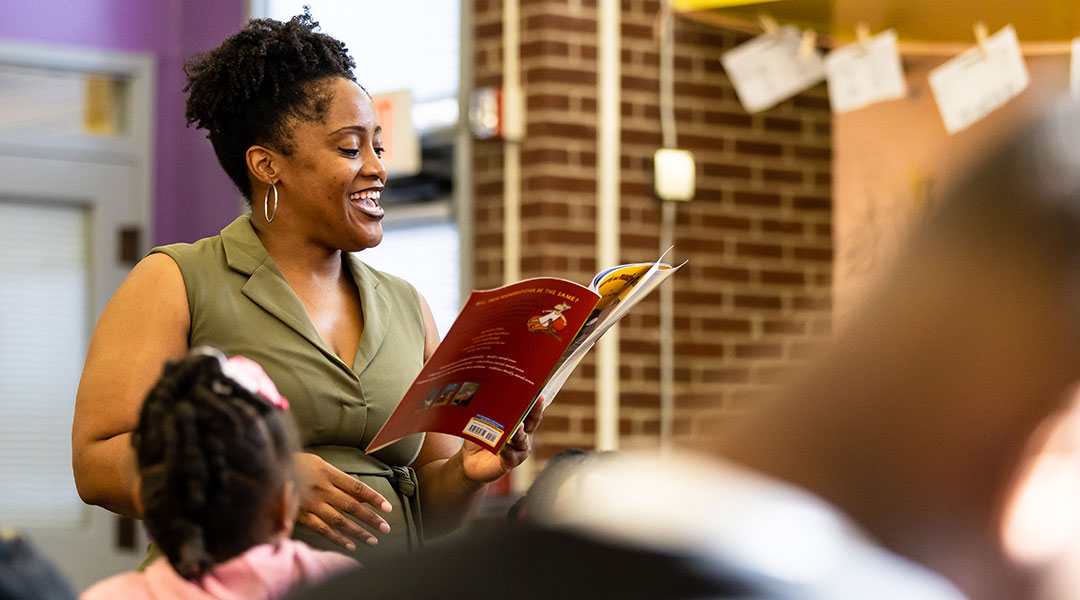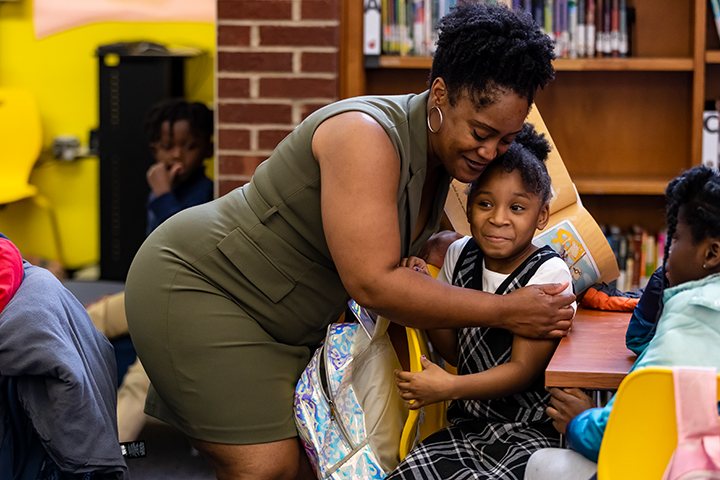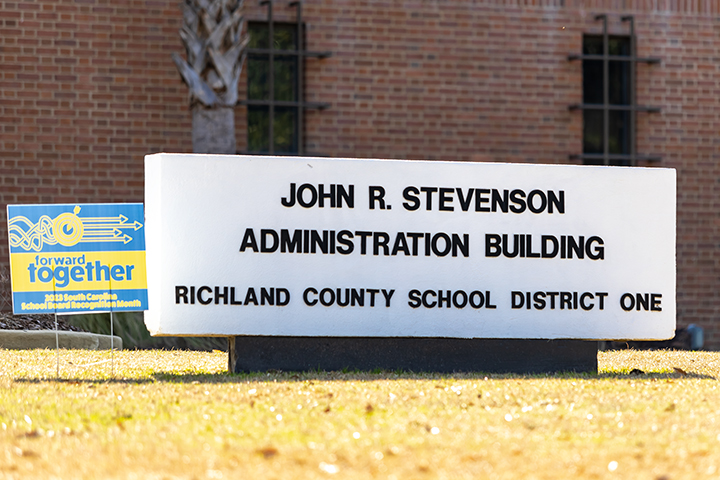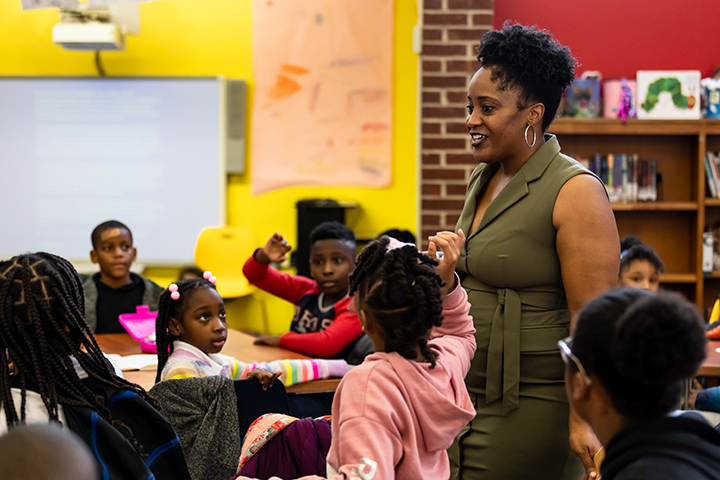Stephanie Johnson, a reading interventionist at H.B. Rhame Elementary, reads a story to students. (Caroline Barry / The Carolina News & Reporter)
Gov. Henry McMaster prioritized increasing teacher salaries during his inaugural address, but teachers and their advocates say it might not be enough.
In his Jan. 11 speech, McMaster said he wanted to raise the starting salary for teachers to $50,000 by 2026. His annual budget proposal mirrored this goal, asking state lawmakers for a $2,500 raise and a $2,500 retention bonus.
“At the beginning of my career, I was a first-generation college student, so I depended on grants, scholarships and financial aid associated with student loans,” said Stephanie Johnson, a reading interventionist at H.B. Rhame Elementary School in Richland School District One. “So starting off at 50,000, decades ago, it would’ve put me in a better position.”
But Johnson doubts the increase would dramatically benefit teachers now, citing inflation and the increased cost of living. The increased salary also wouldn’t solve all the reasons teachers are leaving.
“Will the salary help? Absolutely,” said Tiffany Dorris, a middle school English teacher who quit in 2021. “But I don’t think that it’s enough. I don’t think that it’s a big enough step, and I don’t think that it’s going to resolve all of the teacher issues on the table.”
Dorris had been a teacher for 14 years before leaving the profession. She started her career in Pennsylvania, then moved to South Carolina in 2014. When she moved here, she said her class sizes increased, and she took a $20,000 pay cut.
“Ultimately, I was unhappy for most of my time teaching here in South Carolina …,” Dorris said. “The workload was exponentially larger than what I was used to. Then during COVID, what really pushed me out was the lack of respect and autonomy and professional courtesy given to teachers by parents. That just really put me over the edge, and I just called it quits.”
Dorris is not alone in her decision. According to a report by the Center for Educator Recruitment, Retention and Advancement, there were 1,474 teacher vacancies in South Carolina as of this month, a near 40% increase from last year.
“We get calls every week asking, ‘Well, how much would it cost to buy out my contract? Could I buy out my retirement? Can I buy out?’” said Sherry East, the president of the South Carolina Education Association, a teachers advocacy group. “So, we’re desperate, you know. People want to be done. They want to be done.”
East said salary was not the main factor either for those who were calling. Oversized classrooms, issues with discipline, emphasis on test scores and the lack of respect for the profession were the motivating factors for many teachers who left, she said.
Richland School District One’s superintendent, Craig Witherspoon, echoed those concerns.
“We’ve talked to a number of teachers that, because of stressors and those things that happen, they say it’s not just that I’m going to another school district, but I’m going to leave education,” Witherspoon said.
And for the teachers who stay, their workload keeps increasing, some say.
“We pretty much have to make up for any losses that are there,”said Johnson, the elementary school teacher. “It’s ideal at the end of the day for you to be able to stop everything that you do that’s associated with working … . But there’s such a need, and this is such an intense time in education that it’s hard to navigate that.”
In response, S.C. politicians have taken different approaches to improving teachers’ working conditions. Sen. Greg Hembree, the head of the S.C. Senate Education Committee, said he is committed to getting more educators in classrooms.
“We’ve got a real, real shortage and we’re, we’re struggling,” said Hembree, R-Horry County. “We are trying to figure out ways to get more educators in the classrooms and try to address that. One is a recruiting tool, a stipend. We give a stipend for engineering and math majors, and this would give education majors that same stipend. So, hopefully, we can get that through this year.”
For Sen. Mike Fanning, D-Fairfield County, helping teachers recoup time for teaching, planning and rest is important for improving their work environment.
“We have dumped more and more bureaucratic bologna on top of them every single year, with more testing and more paperwork, accountability and less time in the classroom,” Fanning said. “It’s taken the joy out of learning.”
A former high school history teacher, Fanning said his policies focus on letting teachers inspire students. He has advocated for smaller class sizes, less testing and giving teachers more control of what they teach.
Johnson hopes that this next legislative session will change things for the better.
“My hope is for teachers to be respected and held to as high a standard as any other profession, and that we continue to receive support,” Johnson said. “ It’s an extremely challenging time in education. So something has to be done to help relieve some of the challenges that we are facing.”
Johnson said she would never stop teaching because she is “dedicated and passionate” but still hopes to see the profession improve. (Caroline Barry / The Carolina News & Reporter)
Richland School District One is holding a career fair on Jan. 28 to fill some of its vacant positions.
“We also have to overcompensate in studying, attending to training and just finding more ways to better support our students,” Johnson said. “I try to do the best that I can.” (Caroline Barry / The Carolina News & Reporter)
ABOUT THE JOURNALISTS
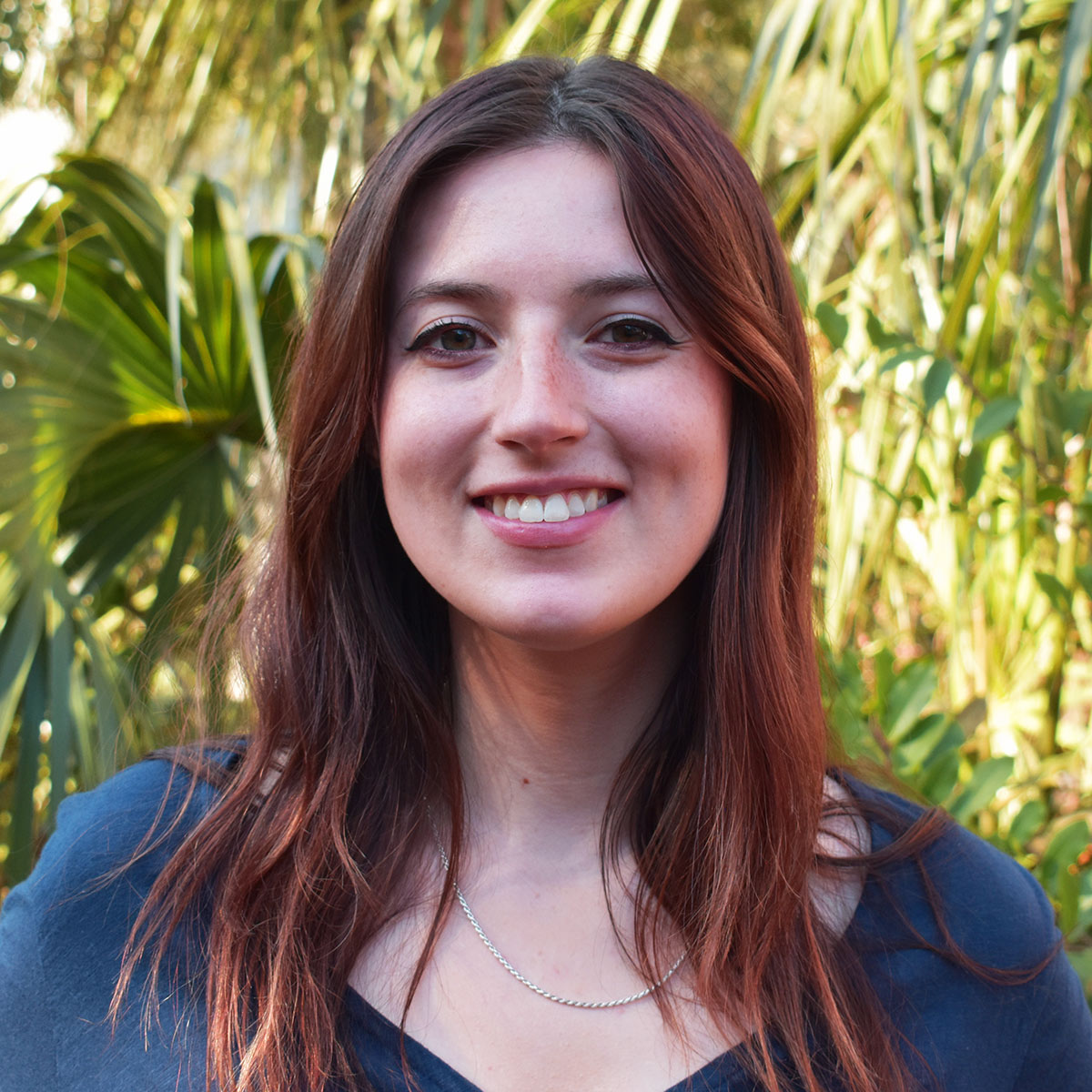
Danielle Cahn
Cahn is a junior journalism major at the University of South Carolina. She has reported on topics from flood research to substitute teacher shortages in the Richland 1 school district. Her reporting on the latter topic was published by The State newspaper. When not chasing stories in Columbia, she is likely home in Atlanta wrangling her five rescue animals.

Caroline Barry
Barry is a Master of Mass Communications candidate at the University of South Carolina. She specializes in sports photography and storytelling. That led to working extensively in university athletics through creative media internships with Gamecock Women’s Soccer and campus communications. She covered multiple NCAA and conference tournaments and earned her own conference championship ring while working with the soccer team as its team photographer.

